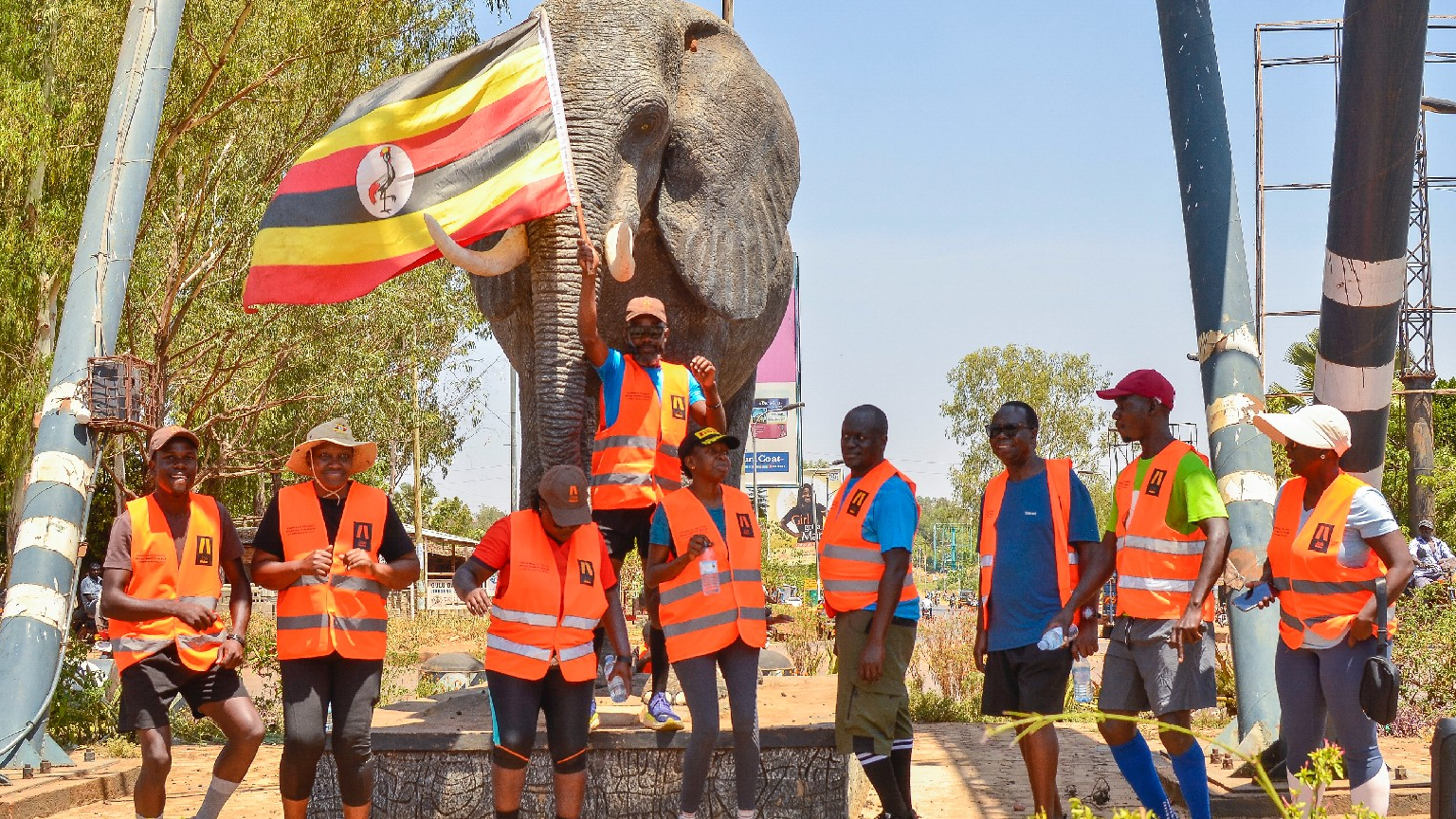
340km later, Joe still craves more walks
What you need to know:
- He walked miles in his shoes. Joseph Beyanga, who earned himself the moniker, Joe Walker put in time to train, eat right and got a team to walk 340km from Kampala to Bushenyi .
- Joe Walker tells Andrew Kaggwa what it was like to walk miles in his shoes.
The plan was to walk 340km from Kampala to Bushenyi to create awareness on road safety. This involved months of preparation, in the boardroom, church and on the road.
Joseph Beyanga, alias Joe Walker, the head of radio at Nation Media Group- Uganda, says he was ready to start the walk even on the Sunday leading up to Monday February 28, the day he was supposed to set off. He had a diet plan, a training that saw him walk specific distances to get his body ready, yet to the ordinary world, what he was yet to embark on was received with mixed reaction.
Some people called him daring and congratulated him for his courage, others ironically his colleagues joked that he was choosing an honourable way of dying.
“Yes, I heard some people say I was looking for a way of going out with honour, those idiots…,” he says with a hearty laugh.
But Beyanga worked with a team and some of these set off with him at the Monitor Publications offices in Namuwongo, Kampala. Earlier, he had been in church and they had prayed with his pastor and family.
“I went back home, I had packed everything I wanted to take, the first aid kit and clothes. I started counting the hours I wanted to start. I was ready. On Monday, when Tony Glencross, the managing director of NMG handed me the Uganda flag, I was ready to fly. Finally, we were off,” he says.
Setting off
The flag off that was broadcast on NTV was intimate. Besides colleagues, many people attended, making the event an emotional rollercoaster. His wife, mother, sisters, his best friends since 1994; Ethan Mussolini and Ben Mwine. Then, Nicole Foundation, a body in memory of Nicole Blessing Ahumuza who died at 16 in a fatal accident in Kasese, among other stakeholders such as sponsors.

Day one ended in Mpigi that was after a day that had seen them engage traffic police and the road users. By the time Beyanga and team were in Mpigi, the terrain was different.
The terrain
Forget the Kampala hills he conquered for practice.
“I knew the terrain we were up against, there were small hills here and there. I wasn’t expecting as many hills between Kampala and Bushenyi as compared to Kololo, Naguru or even Kibuli. The bit I knew existed but I didn’t think it would be as I found it, was the long stretch, especially after Masaka. There, you encounter sharp bends and stretches that are a bit lonely.”
The heat increased to 35°C that he still has sunburn effects. Even then his spirits were never dampened.
“When I was walking in these lonely stretches, I was physically alone but walking with more people than I have ever walked with on Kampala’s congested roads,” he says.
The walk was documented on traditional and social media, the name Joe Walker and a corresponding hash tag. Some colleagues showed up and walked a day or two while well-wishers walked in their respective locations.

The morale boost did not mean he was immune to emotions. For instance, he says by day five, as they left Kinoni, things were different.
“Apart from the purpose, I was physically tired, and it had been scorching hot but I am a fan of sunsets. As we left Kinoni Town, there was a beautiful sunset. So, I started jumping and posing for photos, and I came alive and remembered to celebrate every milestone,” he says, adding that celebrating a win gives you energy to aspire for something better. For instance, if you celebrate getting to Lyantonde, you will not miss celebrating Sanga or Mbarara.
“There is no way I could celebrate Mbarara and fail to get to Bushenyi. Every milestone celebrated was fuel to get to the next milestone,” he says.
Walking with a team
The walk had been meticulously planned. Some of its success, Beyanga attributes to the grace of God and the people that believed in his cause and joined him. For example, while looking for his walking gear, he bumped into Aloysius Kabuye, a biker who started a hobby after noticing that he was always finding gear for fellow bikers.
“So, I bumped into his place when I was looking for a shirt. He took me through the different shirts and he kept advising. I picked three shirts, each cost Shs120,000,”he recounts.

He says the shirts have vents that keep you cool when it is hot and they close when it is cold to keep you warm. Kabuye also told him about the different types of socks available.
“I went for the long socks because they hold muscles together,’’ he says.
With two pairs of socks, he would wash one at night, hang it to dry and wear the other the next day. Some of the guys on his team challenged him to be a ‘real’ athlete by using the same pair of socks and shorts for much of the race but he declined.
“I can neither do dirty socks nor shorts, bikers or shirts. That would have hit me psychologically,” he says.
Kabuye did not stop at the sale and recommendations, he regularly called to check on how they were fairing.
But there were other people such as Janet Nakazzi, that gave him a training programme, then Ivan Bamweyana, who had broken down the trip plan, and his pastor Micah Rwothumio.
“At 60 years old, my pastor was with us for the entire walk. The only day he wasn’t with us was when he returned to Kampala to attend a burial,” he says.
Others included Ethan Musolini, Charles Mwaguhya and Brian Mulondo whose Film Garage did much of the coverage. They also had an advance team that to book the food at restaurants.
The main purpose of the walk was to create awareness about road safety. Were the people they met as they walked, in sync with the message they were spreading?
On the first day, he says as they walked through Queen’s Way, some people hurled insults at them, yet at Natete, the reception was different because some of them had watched parts of the walk earlier on NTV.
“Boda boda guys started calling me Rasta w’engudo (because of the KFM yellow bandana) and that was an icebreaker into conversation,” he says, adding that as they got to places such as Buwama, school children that had also watched him on TV were already calling out Joe Walker.
Originally, he says he was not intending to have a dress code punctuated with a bandana but when people started identifying him that way, he let it be. Some showed sentiments with his choice of bandana colour but appreciated his cause.
“You would meet old people that took a day off from the garden to wait for you. There is a boda boda rider we met and told us he had only Shs2,000 but gave us Shs1,000 to buy water,” he says.
Then, there were other cyclists they met who had their stories of the road carnage, one for instance had been involved in an accident while driving a truck.
As they entered Mbarara, they met a one Kato, who had waited for them at the point where he lost his brother.
“He works in Kampala but when he heard about the walk, he travelled to Mbarara to wait for us at the point he lost his brother. It is people like those that engage with us. It is the people that came on Twitter and Facebook…There was a policeman when we reached Mbirizi a bit late and he said, ‘there was no way I was leaving my post before Joe Walker entered my town and now that you have come, I can go home knowing that you are comfortable’,” he says.

When you read the news, he says, there are usually numbers of people that die on the road. During the walk, they put a face to the numbers, they met colleagues and relatives of these people.
“We met school children that could not cross the road because the person that used to help them was knocked by a car,” he says.
Final lap
On the eve of the final day, Beyanga had looked at his map and noticed it was over. Then, he started thinking of what happens after the walk.
“We started the final day in Kabwohe, it was the only day I did not have breakfast. As we approached Bushenyi, I noticed I was hungry and I did not have money, but because some of these people in the markets here had been following the story were excited to receive us. I asked the women for raw sweet potatoes and they gave me as much but I picked two,” he says.
Then, he was finally in Bushenyi. Elders, school teachers, his mother and his wife were all there for it.
“I don’t even know how I felt, but I was excited,” he says.
That day had various stops, a sports ground at a primary school where he planted trees as part of a fence. He says, when children are playing most of the time, the ball crosses into the road and the trees planted are intended to prevent.
Other trees were planted at a church that his father helped build, more trees at Ncucumo Primary School, his former school. It is after all this that he started retracing the route he used while going to school as a child.
“When we reached home, it was a party. People had cooked, but before we joined in the celebration, we planted a tree,” he says, “we almost planted a forest.”
At home, his team thought all was done and thus were even making plans of getting back to Kampala; “But my idea of Kampala to Bushenyi wasn’t leaving Kampala to come home,” he says.
At around 3pm, he told his team that there were more than 12km to go, and thus started planning for accommodation.
Soon, they made it to Bushenyi Town and just like before, he celebrated that win with a picture that was later shared on social media to celebrate his feat.

Today, after a few rests, he has started in the hills of Kampala again, he hopes to get to his best again as he braces for more walks in future.
The grit
He says this is just the beginning of more walks and awareness but above all, he says there were many lessons he picked while on the road, the most important one: “The body never gets tired, it’s the mind that gives up.”






